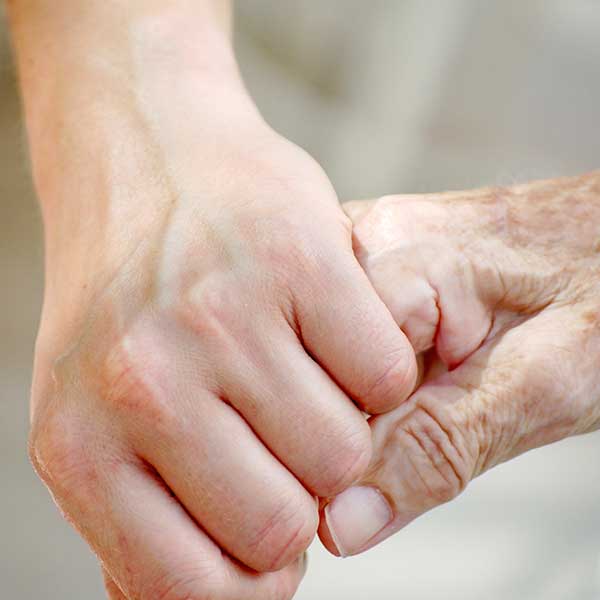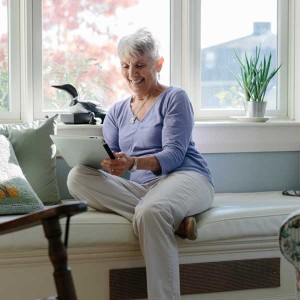
Taking on the responsibilities of elderly care can be a daunting task – especially in the beginning. Whether you had anticipated becoming a caregiver or were suddenly thrust into the role, the job requires an abundance of energy, patience, and above all else – love.
All the love in the world does not take care of the logistics involved in planning and implementing elderly care. Deciding on the type of care that will work best for your loved one is often a difficult task with many factors to consider. However, it is important to remember that you are not alone; there are likely people in your life who will offer emotional support and agencies and professionals to provide resources when needed.
If caring for elderly parents becomes too much for you to handle, especially as the health and needs of your parent change, you may need to seek different arrangements. Being prepared, yet flexible and giving will help you to create a loving atmosphere where your parents’ needs are met in the best way possible.
Where to Start: Opening Communication and Assessing Needs
 Caring for elderly parents can feel like a full-time job. Much like the struggles of parenting, elderly care involves constant worrying and scrambling to meet daily needs, all while figuring out how to navigate and adapt to changing roles within the family. When deciding on the best living or caring situation for a parent, take the time to have a meaningful conversation with your loved ones and hear what their hopes and concerns are regarding their present state and future plans. Remember, they are going through a difficult time. They may be experiencing pangs of fear, shame, depression, or be battling chronic pain day in and day out. Take the time to understand the core problems and value their input.
Caring for elderly parents can feel like a full-time job. Much like the struggles of parenting, elderly care involves constant worrying and scrambling to meet daily needs, all while figuring out how to navigate and adapt to changing roles within the family. When deciding on the best living or caring situation for a parent, take the time to have a meaningful conversation with your loved ones and hear what their hopes and concerns are regarding their present state and future plans. Remember, they are going through a difficult time. They may be experiencing pangs of fear, shame, depression, or be battling chronic pain day in and day out. Take the time to understand the core problems and value their input.
Voice Your Concern
It is often difficult for adult children when they begin to notice that a parent is noticeably in need of care. Communication is key and your approach will be essential in how your elderly parent responds to change. Remember, it is often difficult for parents, the people who have decades of experience caregiving to suddenly need care or supervision themselves. It can be an emotional topic to discuss and it is natural to want to shy away from these difficult feelings. However, addressing your concerns head on in a sensitive, loving way will lead to an emotionally safe and compassionate climate. Remember that parents may be defensive or deflect the issue. Be sure to bring things up from a concerned standpoint as opposed to using an accusatory tone. It is easy to feel emotional when you see that a parent is not practicing the same level of hygiene, or seems depressed, or in chronic pain. Having a talk and getting to the root of the problem will make the process easier and encourage open, kind, communication.
Discuss Options
There are many different options for elderly care. Keep your parent in the loop and do your best to honor their wishes if feasible. Ideally, if you could have a conversation regarding care prior to needing it, there will be clear expectations and a plan for when the time comes. Often, decisions regarding care must be made after a sudden medical emergency or loss when emotions are running high and changes are more difficult to process and dictate. Maybe your parent needs a to coordinate rides to get to doctor’s appointments or help for personal care such as dressing and bathing. As a family, take a step back and look at the big picture. Think about what will work for the future and what the next step will be if things become difficult. Take a look at your options, finances, and support system to access what may be the best method of care.
The Family Caregiver Alliance provides guidance on how to assess your needs when caring for elderly parents. In reviewing Community Care Options, they suggest asking the following questions for guidance:
- What type of help does my loved one need to live as independently as possible? (Nutrition services? Health care? Supervision? Companionship? Housekeeping? Transportation?)
- How much money is available to pay for outside resources? Will our insurance cover any of the services
- What days and times do I need help?
- What assistance can I provide myself?
- What types of help are my friends and family members willing to provide?
These questions are a great place to start. If you need additional guidance, it might be a good idea to speak with a social worker through the National Association of Social Workers or a geriatric care manager through the Aging Life Care Association. These professionals can facilitate a support meeting to help create a care plan that would be best for your family.
Identify Your Support System
As a caregiver, it is important to have a strong support system to rally around you for both emotional support and relief. If there are other siblings in the area, divide some of the workload such as driving to appointments, personal care, meal preparation/shopping or maintaining the home and yard. Be sure to have friends whom you can confide when you need support or advice. You can also find caregiver support groups online or in your local community for advice or simply to share or vent frustrations. Your Lotsa Helping Hands community can help to organize involvement of family and friends to share some of the responsibilities of caregiving or simply offer messages of support or encouragement.
Emotionally coping with changing roles or a changing relationship is challenging. If you are feeling confused and overwhelmed, take advantage of local community resources. The Family Caregiver Alliance suggests contacting your local Area Agency on Aging for advice or resources on elderly care and inquire about the type of services offered in your area. Find a local senior center nearby to help guide you toward programs or services in the community that would benefit your loved one and offer some relief to you. Be passionate and do your best. Remember, you will make mistakes – and that’s okay. It is important to adjust, act with grace, and continue to try your best.
Helping Your Loved One to Age in Place
 Many elderly individuals have a desire to remain in their homes. It is only natural as home often has emotional attachments and is part of the local community that they have known for many years. If you are a caregiver, there are many ways to support a parent or parents who continue to live at home. Whether you are helping your loved one from a distance or have become a live-in caregiver, there are challenges to face as you help your loved one to age in place.
Many elderly individuals have a desire to remain in their homes. It is only natural as home often has emotional attachments and is part of the local community that they have known for many years. If you are a caregiver, there are many ways to support a parent or parents who continue to live at home. Whether you are helping your loved one from a distance or have become a live-in caregiver, there are challenges to face as you help your loved one to age in place.
After noticing that your loved one is requiring some extra help with daily living, there are several things to consider when trying to decide if your parent is able to manage to continue to live in their home. Below are five factors that contribute to an individual’s ability to age in place.
- Location
Consider the location of your parent’s home. Are there relatives, neighbors or friends who would be willing to help with things such as lawn care, grocery shopping, or simply checking in? How close do your parents live to their doctors and are they easily able to get to their appointments? Are there any programs in the local community that would help them socially or increase their quality of life? - Home Safety
Are there many steps to climb and can your parent easily function in the layout of the home? Could home modifications be made to increase safety and reduce fall risk such as an electronic lift for the staircase, a ramp, handrails, walk-in shower or bathing bench? Is money available for these possible renovations? - Medial Issues
Does your loved one have a medical condition that requires extra care or diligence? Are they able to manage their needs by themselves? Will they need extra help with daily medical routines? - Available Support
Are there family members or friends close by that can offer support when needed and are they involved in your parent’s life? Would they be willing to chip in and share responsibly for things that your loved one needs? If you are a live-in caregiver, are you able to manage your parent’s needs? - Finances
Is your parent able to financially continue to live in their home? Caring for the elderly often comes with added expenses and services. Home modifications may be necessary as detailed under “Home Safety.” Do you need to hire people to help with upkeep such as cleaning, lawn care, personal care, or a part-time nurse?
Caring From Afar
Even from a distance, there are ways to care for a loved one and ensure they are functioning to the best of their ability– physically and emotionally. It is tough coming to terms with your parent’s struggles whether they involve memory loss, frailty, or chronic illness. Being physically far from them as capabilities digress can create guilt and worry. However, there are ways to help your loved one from afar and ensure they are receiving the help they need.
Coordinate Care and Services
If your loved one needs additional help, you can be involved in all parts of the selection process when it comes to a home health aide. Communicate regularly with the agency and establish your position as an advocate for your loved one. Ask questions and follow up when necessary. You may need to dedicate some time each week to spend on the phone or communicating via email with an agency or professional health aide.
Support a Primary Caregiver
When siblings are working together to support a parent, issues such as fairness may invoke feelings of sibling rivalry. Simply calling and checking in will help. Stay posted on what is going on and allow them to vent if necessary. Also, you can arrange to take a few days off from work so a primary caregiver can take a vacation. Even if the caregiver cannot physically get away, a week’s break from caregiving will provide a nice reprieve and allow them to recharge, especially if they are a live-in caregiver. It will mean a lot to the caregiver and give you a chance to spend time bonding with your parents. Plus, spending a lot of time with your loved ones will give you an updated assessment on where they stand mentally and physically, if they need increased care, and whether or not aging in place is the best option for them.
Create an Emergency Travel Plan
Consider creating a plan for travel and time off if your loved one takes a turn for the worse. Research the policies at your place of employment for family sick days, family medical leave, or bereavement days. Creating a temporary plan for coverage and discussing the situation with a boss or human resources staff member will make it much easier for you if you suddenly need to hop on a plane.
Listen and Share
Simply lending a listening ear or sharing details about your day can brighten your elderly parents’ spirits. Often, when elderly individuals feel like they are beginning to lose control, it is reassuring to know that their opinion matters. Be sure to ask how your parent is adjusting and find out what they are happy with in their daily life and what could be improved. But he sure not turn your phone calls into a rapid fire interview. Share details about your life. It will bring you closer together and allow them to feel included in your life. With advancements in technology such as Smart Phones and Skype, it is great to be able to see photos and to talk to family members like grandchildren and great grandchildren. It will boost spirits and decrease feelings of depression, loneliness and isolation.
Options for In Home Care
 Your parent may not be able to live on their own, so need in home care services might be the best option. They may need 24 hour care or part time care. Financially, this is a big step and is a huge fiscal responsibility that can be taxing on a savings account. Be sure to find a situation with which you are comfortable. Keep communication open, remain approachable and check in often with your parent to see how they feel about the care they are receiving. Also, be sure to communicate regularly with care professionals to stay updated regarding any issues or concerns.
Your parent may not be able to live on their own, so need in home care services might be the best option. They may need 24 hour care or part time care. Financially, this is a big step and is a huge fiscal responsibility that can be taxing on a savings account. Be sure to find a situation with which you are comfortable. Keep communication open, remain approachable and check in often with your parent to see how they feel about the care they are receiving. Also, be sure to communicate regularly with care professionals to stay updated regarding any issues or concerns.
There are several types of elderly home care from which to choose. Below is a basic description of each type of in home care so you can figure out which solution works best for your personal situation.
Home Health Agency
A home health agency is a care services that provides medical aide. Home health agencies are licensed and often accept Medicare and other 3rd party billing of health insurances. Being Medicare-certified is an advantage because it means that the agency has met specific federal guidelines regarding patient care. They provide skilled caregivers who must adhere to a physician-approved plan for treatment or rehabilitation. However, Medicare only covers treatment for a specific period of time to treat an illness or injury.
Often, after medical services are no longer needed for an injury, patients still need help with personal care. Sometimes, home health agencies have a private pay component for personal care or custodial services similar to a home care agency.
Home Care Agency
A home care agency is not a medical agency. Home care agencies do not accept Medicare and therefore operate through private pay. In some cases, they accept private long-term care insurance. When using a home care agency, care is not considered medically necessary. Though they operate through private pay, home care agencies are usually still licensed through each state; however, state regulations vary. Most agencies employ their own staff and therefore conduct background checks and manage payroll and taxes. They also supervise and manage staff in regard to patient care.
Staffing Agency
A staffing agency can provide the same services as a home health agency and home care agency (medical and non-medical services) such as nurses, nurse assistants, and rehab therapists. However, the agency acts solely as an employment service and does not manage the employee. They simply match an independent contractor to your needs. The client (you) acts as the employer and supervisor, often pays wages directly, and are responsible for payroll taxes and social security withholdings. While managing your own employee can offer more independence and flexibility to your personal situation, this service does not guarantee thorough background screenings and license verifications. Many states do not require staffing agencies to be licensed or follow specific regulations for this type of elderly home care.
Independent Providers
Independent providers are privately employed and managed by you. Therefore, you take on the acts of recruiting, hiring, and supervising. You pay the client directly and therefore manage payroll taxes and social security withholdings. Using independent providers for in home care may cost less than agency hires due to not having overhead costs for recruitment and management.
Assisting with Finances and Planning for the Future
 Financial Plan
Financial Plan
For many people, money is an uncomfortable topic to broach. However, it is important to communicate openly about finances as parents age and levels of care change. Establishing a financial plan is an organized way to manage money. A structured plan will help all parties to feel at ease as it creates transparency, encourages routines, and helps to plan for the future. Depending on the mental functionality of your parent and their particular care needs, financial plans will vary. When deciding how to manage money, consider the following five tips.
Open the Conversation
Before transitioning to a new living or caregiving arrangement, ask your parents how they would like to handle their finances. Keep in mind that your elderly parent is most likely struggling with the idea of needing help with personal care of medical issues. Feeling as though they do not have control of their own finances can cause a myriad of emotions – among them anger and hopelessness. Allow your parent to feel included and in-control when it comes to managing money. Every situation is different, but communicating openly about expenses from the beginning will make an often uncomfortable, but important, topic approachable. Perhaps open a dialogue by expressing that managing finances when it comes to elderly care can be extremely confusing (for everyone) and you want to make sure that nothing falls through the cracks because it is an overwhelming task. Do not talk down to them. Work with them and respect their opinions.
Assess Needs
Taking care of loved ones comes with new and sometimes unexpected expenses. You may need to make renovations to accommodate a wheelchair or install an electronic lift on the staircase or walk-in shower. Even though your parents might not need these accommodations now, things can suddenly change. You may want to create a monthly budget, simplify banking by merging accounts, or obtain permission to write checks for your loved one. You may need to petition to become your loved one’s guardian to access control of their finances (even if you are strictly paying for their care).
Appoint Roles
Elderly parents need help with finances. If you can organize for a primary point person when it comes to finances, it will be easier. That way it is easier to ensure that all bills are paid, check on financial status, and keep an eye on the bank account. You may need additional support. Arrange a meeting with your parents’ CPA or financial planner to address their financial accounts and be sure you are aware of their plans and wishes for the future in regard to finances.
Keep A Watchful (Yet Flexible) Eye
Your parents have worked hard for their money. After all that hard work, it will be difficult for them to feel like they do not have control over finances. Though you may be watching your parent’s checkbook, be sure to leave some wiggle room. There may come a month when they want to splurge on gifts for grandchildren or buy themselves something nice. We all indulge ourselves from time to time, so it is important to understand and be flexible. With that said, keep an eye on unexpected or extreme transactions. If your parents are suddenly spending a large amount of money or buying things that are out of character for them, you need to step in and assess the situation. Unfortunately, as mental capabilities and memories digress, your elderly parents may not be able to spend their own money. Be wary of scam artists posing as the IRS or a collection agency who look to take advantage of elderly individuals. Perhaps, post a reminder by the phone directing your parents to transfer all financial inquiries to you.
Tips for Home Safety and Organization
 When caring for the elderly, it helps to have a care plan. Establish routines and put procedures in place when it comes to daily activities and unexpected circumstances. Keeping the home or living space as safe as possible should be a priority as it will minimize injury from falls and make daily living as easy and convenient as possible.
When caring for the elderly, it helps to have a care plan. Establish routines and put procedures in place when it comes to daily activities and unexpected circumstances. Keeping the home or living space as safe as possible should be a priority as it will minimize injury from falls and make daily living as easy and convenient as possible.
Home Safety Checklist
Each room of the house and surrounding exterior should be regularly checked to ensure your loved one is as safe as possible. Starting with the exterior of the home, walk through each room of the house (in your mind if you do not live in the area) and address the following questions in order to take the precautions necessary to keep everyone safe.
Exterior/Entrance
- Do you have handrails or ramps if necessary?
- Are there cracks in the sidewalk or stairs that could cause a fall?
- Is there enough light at night for individuals to get in the house safety and see potential visitors?
- Is the door easily locked and opened from the inside?
- Is your loved one at risk for wandering out of the house? Can additional locks be added?
- Can they hear the doorbell?
Living Room
- Is the area free from clutter?
- Are there throw rugs and exposed cords that could be tripping hazards?
- Is the floor uneven or slippery?
- Is furniture steady? Can it support weight and allow for balance assistance?
- Is there enough light and are light switches reachable?
- Are books, television, and other items easily accessible?
- Is the temperature comfortable?
- Are pillows and blankets available for additional comfort?
Bathroom
- Are there grab bars or support systems to help with balance?
- Is the floor slippery? Are mats and rugs used?
- Is the toilet too high or low? Could a special toilet seat be purchased?
- Can they step into the shower? Is the tub too high?
- Could you purchase a shower chair or bench?
- Are cabinets accessible? Are items stored too high to reach comfortably?
Bedroom
- Is the bed too high or low to access comfortably?
- Is the area decluttered to avoid tripping?
- Is there a table near the bed with necessities (glasses, telephone, medications)?
- Is a bathroom easily accessible?
Hallways/Staircases
- Is there enough light at night?
- Are smoke detectors working?
- Are there tears or bumps in the rug, or uneven floors?
Kitchen
- Does general access to cabinets need to be monitored?
- Are dangerous chemicals stored away?
- Are knives put away?
- Is there enough light for cooking?
- Are emergency numbers easily found?
- Are food and medications easily accessible?
- Is the floor slippery? Could mats or rugs be added?
- On the contrary, do any rugs or mats pose as obstacles?
- Is food fresh? Check labels for expired items.
- Are smoke detectors installed?
- Is there a fire extinguisher available? Do family members know how to use it?
Important Documents
Important papers and vital information should be contained in a specific area. Elderly individuals could also fill out a guide for loved ones informing where different paperwork or medical items are located if necessary.
There are many situations that can unexpectedly occur that call for you or your loved one to produce specific documents. Organizing and keeping documents in a safe and known location will save you from hours of searching and stressing in an urgent time.
Below is a list of important documents that should be filed away in a safe place. It may be helpful to keep a list of all important documents organized by their location. For example, some items may be in a desk drawer, and others may be found in a safe or safety deposit box.
Financial Documents
- Financial Power of Attorney
- List of Bank Accounts
- List of credit cards, loans, and debt owed
- Pension Documents
- Tax Returns
- Savings Bonds
- Stock Certificates
- Property Deeds
- Vehicle Titles
Healthcare Documents
- Health Power of Attorney
- Living will (healthcare)
- Personal medical history
- Insurance card
- Insurance policies
Estate Planning Documents
- Will
- Trust documents
- Life insurance policies
- Special End of Life Instruction Letter
Identification and Other Documents
- List of safe deposit boxes and the location of their keys
- Birth certificate
- Driver’s license
- Social Security card
- Marriage certificate
- Divorce documents
- Military records
- List of online usernames and passwords
Emergency Response Plan
To be prepared, an emergency response plan should be in place in case of an environmental or medical emergency or if health digresses rapidly or unexpectedly. Preparing ahead of time will save a lot of stress in often emotional and trying times.
If your loved one is receiving health services at home, be sure to discuss emergency procedures with the care provider. Do they have a specific system in place or can you formulate an individualized plan together? Develop an exit strategy for easy and safe transport and keep a list of all emergency numbers and contacts.
Walk through a typical day and make a list of supplies that you would use. Then expand your list to items you would need on a weekly or monthly basis or in case of emergency. Keep an emergency bag in an easily accessible location that contains all necessary personal care and medical items.
The following items should be included in an emergency kit in case of natural disaster or state of emergency: drinking water, food, flashlight, first aid kit, spare batteries, a disposable telephone or battery operated phone charger, medications, a medications list, backup prescription glasses, extra clothes, emergency medical form, portable radio, extra clothes, and blankets.
Conclusion
 As elderly parents begin to require more care, responsibilities that you never considered may fall onto your shoulders. It is important to remember that you are not alone and to seek out the support that you need. You cannot do it alone and you do not need to. Caregiving tasks can seem unending leaving you overwhelmed and exhausted.
As elderly parents begin to require more care, responsibilities that you never considered may fall onto your shoulders. It is important to remember that you are not alone and to seek out the support that you need. You cannot do it alone and you do not need to. Caregiving tasks can seem unending leaving you overwhelmed and exhausted.
Make sure to take a break and do something for yourself when needed. As a caregiver, it is important to avoid burnout and to take respite when needed. If you are a live-in caregiver, make sure that you can get out of the house. Arrange for a time during the day when you can run errands, go to the gym, or meet with a friend.
Remember, if caregiving tasks become too much for you to manage, you may need to change your plans. Nobody can foresee the future, but you can do your best to be prepared by educating yourself about your options and your parents’ needs.
Whether you are providing care yourself or outsourcing from a professional, your loved one is depending on you to help make the best choices for him/her. While moving might be the best decision for you and your parent, making the transition can be difficult. Taking the time to plan ahead will create a smoother transition for everyone in the family. By staying organized and educating yourself on their needs and the services available, you will have tools necessary to help form an appropriate care plan.

